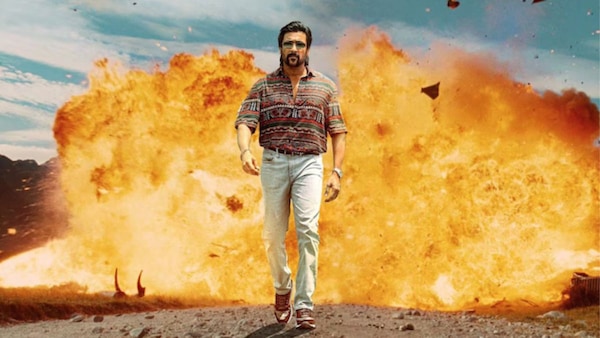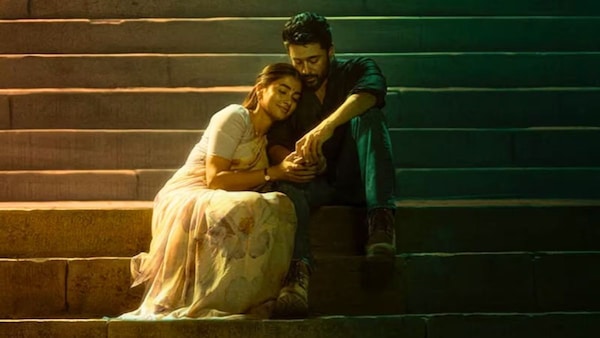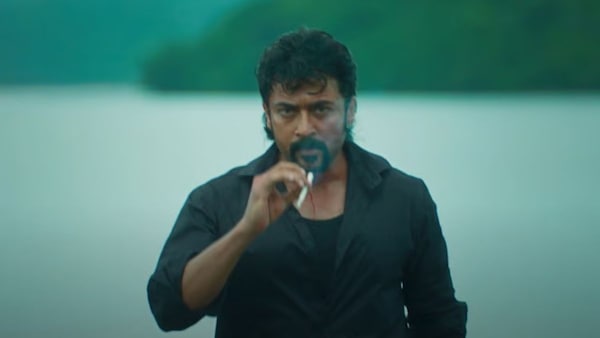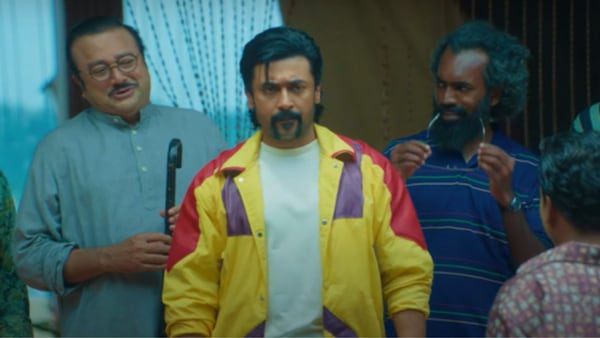Retro: So Much To Love, Very Little To Feel
The weakest link in Karthik Subbaraj’s Retro is emotions. You see love, do not feel it; see oppression, not the fire or resignation in the eyes; see oppressors, not beyond their manic energy.

Still from Retro.
Last Updated: 05.37 PM, May 02, 2025
YOU CAN SAY MANY THINGS about a Karthik Subbaraj movie, but one thing you can never accuse it of is being lazy—be it ideation, fine use of technology, great performances, shock value, irony, smart humour, or just the world he creates. And, with every film, you can see that he’s developing a stronger voice on what he wants to say. Jigarthanda DoubleX was an example. But, the one thing that is sorely missing in his films with the same intensity is emotion—that one thing which brings the rest together, and makes them work. Retro, starring an effervescent Suriya, falls in the same category.
On the face of it, a love story that blooms on the steps of a burning ghat, between two children who have lost their mothers—a boy who can never smile and an angelic girl—makes for an interesting start. When that boy (Paari) becomes a man, little knowing the source of his immense anger or strength, and meets the girl Rukku/Rukmini, who told him to smile, like his adoptive mother did, Karthik does not opt for a saccharine sweet set-up. A dog pees on him, and the two soulmates who probably never forgot each other embrace each other like they were primordially meant to. And, you buy that love because you saw it being born by the pyre. You also buy the fact that Paari is willing to give up everything for Rukku, who is a peace and animal-loving person.

Karthik writes women who punish their men because of ideological differences very well—it might seem a flippant reason, but for the women, that reason is everything. Be it Naachi (Simran) in Mahaan or Rukku (an interestingly cast Pooja Hegde) in Retro, they believe in their stand—never drinking, and never picking up arms or fighting again. A character explains it beautifully to Rukku: "You want Paari to be a Buddha, but his dhammam is to vanquish evil like Krishna."
With all this backstory, you should ideally be beaming when Paari finally smiles, but it does not quite work out that way. While your head understands all that is happening and can comprehend the way, you don’t experience full payback, because you don’t connect with what’s happening. The brown-facing of Pooja Hegde does not help at all—because you’ve seen her on screen before and know how she looks—and the utterly strange shade of brown hits you first and tells you, look ma, make-up. You have to cast that feeling aside to feel for her Rukku, though she does give the character her all. Rukku is the mother-figure, Rukku is pixie-dust, Rukku is the balm to Paari’s wounds, but Rukku is also the one who wounds.
Suriya is back in his element after a brief break—as an angst-filled man struggling to find purpose in life, he’s lovely, even more precisely, his eyes are. Paari is drawn to people and places beyond his control—he’s equally drawn to pain and punishment—probably because of some inter-generational trauma faced by his people.

In the villain’s camp are Paari’s adoptive father (a flimsy role, with Joju George struggling to lend it some heft), an unwell and delusional man who thinks he’s king (Nasser is horrendously realistic as a person who struggles to breathe when confronted with reality), his perennially-high son Michael (I really hope to see Vidhu in a softer role; his eyes and voice deserve it) who thinks the Andamans is a perfect place to hold Gladiator-like games for the entertainment of white people, using the rubber mallets and shields he makes from his rubber plantation, and the politician played by Prakash Raj, who can sleepwalk through this role with zero layers. None of them or all of them together are no match really for Paari, and that’s one of the biggest issues why the film does not land the way it ought to have.
What I found rather interesting and pregnant with possibility was the fact that it's not just Paari, but an entire community that has forgotten to laugh, that has forgotten it has a voice. So much so that a smile doctor (Jayaram) and Paari teach people to smile in a place usually used for hanging. Forget everything else, that alone should have been enough to turn this into a rousing oppressed-oppressor battle. To use laughter as resistance, to use a smile as a weapon… that's where Retro comes alive.
Everyone’s been talking about the single-shot, and ‘Kanima’ (Santosh scores big with this song and in some of the BGM), but yes, while that’s lovely, that’s a talking point. The film has so much more to unpack. For instance, the cinematography—you’re yanked into the 70s and 80s with so much pop of colour (cinematographer Shreyaas Krishna). Much later, when the people see Jeda Muni in Paari, framed against a dark blue, glowing sea, the framing leaves you with goosebumps.

When you watch a film like Retro, you return in a conundrum—do the good parts help tide you over the average ones? Do the good parts give you enough joy to make up for the other parts?
I’ll say this—the weakest link in Retro is emotions. You see love, don’t feel it; you see oppression, don’t see the resignation or fire in the eyes; you see oppressors, but don’t see beyond their manic energy.
Once Karthik figures out a way to wrap his hands around that chord called emotion, and resists the need to force-fit a song with Shriya Saran in a creation like this, his films will thank him some more. And until then, we can celebrate the fact that Karthik never stops trying.
